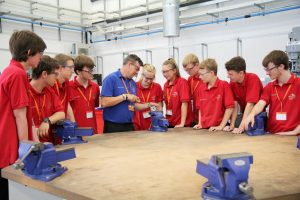How do we recruit more young people to join the manufacturing industry?
While Generation Z has shown more interest in manufacturing jobs than previous generations, millennials (defined as those who were born from 1981 to 1996) have shown little interest in taking on manufacturing jobs. Much of the reason for that is a lack of understanding of what a career in manufacturing entails. So, recruiting more young people into the industry will involve overcoming those misconceptions.

Reasons young people disregard manufacturing as a career
Some of the specific reasons young people have avoided working in manufacturing include:
- Perceiving manufacturing workplaces as harsh, outdated, and dirty places to work (they’re not)
- Believing that manufacturing provides only low wages (it doesn’t)
- Lack of awareness of manufacturing jobs
- Lack of influence from educators to consider work in manufacturing
- Perceived lack of opportunity for advancement or fulfillment
Changes in the industry
Many of the above issues are based on outdated concepts. Manufacturing has seen a great deal of change, and the younger generation should be made aware of the advances that are happening right now in the industry. This includes:
- Greater need for technical savvy and training
- Increased use of technology, including VR devices, robots, and IoT devices
- Reduced need for unskilled labor
In essence, the industry as a whole is becoming one where skill with technology is more important than simple manual labor. That’s a role young people—who are highly tech savvy—are well suited to fill.
Ways to attract young people to manufacturing
Some of the tactics manufacturers can use when recruiting young people include the following.
- Actively dispelling myths about manufacturing
- Using social media to educate people on the nature of manufacturing jobs
- Supporting training programs and policy that encourage education about manufacturing
- Co-mentorships—older workers teach younger ones work processes, while the younger workers help the older ones with the technology
- Focusing on the increased use of technology in the workplace, such as new technician tools or devices
- Use the term “make” instead of “manufacture”—the “maker movement” is very much alive among millennials, who tend to prefer work where they create their own stuff
- Emphasize opportunities for development (and thereby fulfillment)
- Summer camps and education programs
By employing a few of these methods, manufacturers could start to attract more members of the younger generation to their facilities and overcome their staffing issues.
Want to keep reading?
Overcoming the Skills Gap in Manufacturing
How viable is facility management as a career choice?
How to Be a Successful Maintenance Supervisor
4,000+ COMPANIES RELY ON ASSET OPERATIONS MANAGEMENT
Leading the Way to a Better Future for Maintenance and Reliability
Your asset and equipment data doesn't belong in a silo. UpKeep makes it simple to see where everything stands, all in one place. That means less guesswork and more time to focus on what matters.


![[Review Badge] GetApp CMMS 2022 (Dark)](https://www.datocms-assets.com/38028/1673900459-get-app-logo-dark.png?auto=compress&fm=webp&w=347)
![[Review Badge] Gartner Peer Insights (Dark)](https://www.datocms-assets.com/38028/1673900494-gartner-logo-dark.png?auto=compress&fm=webp&w=336)
